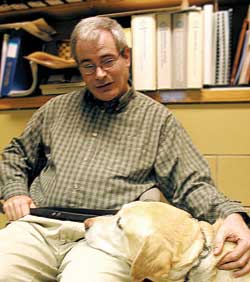Leo Bissonnette balances work, life and studies

Leo Bissonnette with his longtime guide dog, Nugget
Photo by allison martens
Since she was three years old, Leo Bissonnette’s teenage daughter has seen her father working at the computer at home.
“As a child, she used to bring me sandwiches,” Bissonnette said.
Through his early days — he would set his alarm clock for 4:30 a.m. so he could work on his dissertation before going into work — and countless weekends spent deep in study, his wife and daughter have always stood behind him.
Without their support, Bissonnette says he could not have completed his PhD in Educational Technology. For the last 14 years, he has balanced family with his studies, as well as his full-time responsibilities as Coordinator of Concordia’s Office for Students with Disabilities.
Bissonnette himself lost his vision as an infant, due to degeneration of the retina.
In his 400-page dissertation, Bissonnette examined the support faculty members require to make the university experience more accessible to students with disabilities.
“I went back to do my PhD out of my own interest, and it’s worked well because it’s given me something that will help me fulfill my career at Concordia with a very clear agenda,” he said. Bissonnette also holds a BA and MA in sociology from Concordia.
During his research, he surveyed and interviewed more than 300 Concordia faculty members. Almost 80 per cent had no idea how to accommodate in their course materials the unique needs of students with disabilities.
Bisonnette said that this is a problem faced by educators around the world.
He emphasized “universal design,” that is, ensuring the needs of all students are met from square one. He said progress is already being made.
“We’re starting to design websites that are adapted to the needs of students with disabilities now, instead of going back retroactively when one of them shows up on our doorstep.”
At Concordia, Bissonnette has pushed to make the shuttle buses more accommodating for students with disabilities. He has advised on design of new buildings, and with the collaboration of Facilities Management, recently helped to introduce an access card system that ensures students with physical disabilities are given priority in the Hall Building elevators.
Now, he is assiduously working toward increased faculty support.
“We have to get the message out that for students with disabilities, graduate-level programs are just as do-able as undergraduate ones.”